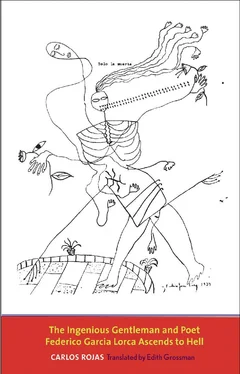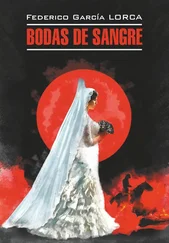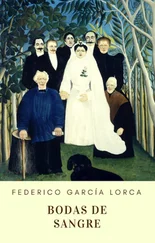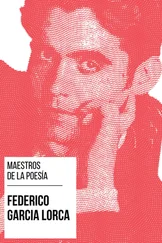“It was a few months, I don’t remember how many, before Sánchez Mejías was gored in Manzanares.”
“Very good, that’s exactly what I was getting to. Sánchez Mejías himself came into the café and approached all of you, as if he were following you in an inevitable, embarrassing way. I recognized him right away too, from the papers and because I had seen him fight several times. From my table I heard everything you both said and I wasn’t ashamed of listening. At first my dignity as a soldier disapproved, even though I was dressed as nobody, a civilian. Immediately I told myself that if you, being who you are, appeared with those Gypsies, then I could lower myself too, to the point of eavesdropping on a conversation you held in loud voices even though it was private. I hope you can forgive me … ”
“I can’t forgive you for anything, Commander Valdés, because I’m a dead man. I don’t even understand why I’m still alive. And I understand even less what the point of all this is.”
“Excuse me if I seem long-winded. I’ve had too many sleepless nights and it’s hard for me to state ideas precisely.” He raised his palms to his temples and then folded them over the pit of his stomach, rubbing his tunic. (“ … I requested a leave and went to Madrid for a week to have an ulcer treated.”) His hands were paler than ever, their whiteness resembling that of a boiled or frozen monkfish. “Sánchez Mejías, that rock of a man, all fiery courage, pleaded for the privilege of your company and you persisted in denying it, reproaching him for his affair with a foreign woman when he was Argentinita’s lover. He requested permission to go with you to lunch and you replied drily: ‘Nobody’s invited you.”’
“He said a restaurant was a public place and he could have coffee there if he wanted to. He left to wait for us in the street and then follow us. He sat at another table, in the rear, and ordered a manzanilla sherry.”
“Precisely! It seems incredible that you remember everything and have forgotten me because I also followed you to the restaurant, as if I were the shadow of the two of you. Your shadow or your dog. You threw out the Gypsies and called to Sánchez Mejías. ‘Come on, man, tell me what you’re having and how the bulls will turn out this summer.’ Hesitating, but more overwhelmed by fatigue than by doubts, he went to your table and let himself be invited.”
“I still don’t understand … ”
“You don’t know how much I admired you then. And I couldn’t decide what astonished me more, your authority or your compassion. Perhaps my respect for your pity was greater than what I felt for your dry power over that giant, because I’ve always had the gift of command and more than enough opportunity to demonstrate it here in Granada, since the beginning of the war. I never felt pity. Not for my neighbor and not for myself.”
“Not for yourself and not for me.”
“Exactly, not for you and not for myself. No sir, neither one, though I recognize that it’s more to my advantage to be compassionate even if I were a coward. On the other hand, you must admit that pity makes no sense in this country and in this war. The duty of all of us, your side and ours, is to exterminate one another without caution or hesitation, until one or the other is incapable of killing. It doesn’t pain me and I don’t reproach you for it because we all obey orders and follow moral principles. If we must devour one another like wolves, I’d hope only that we don’t lie to ourselves as men.”
I wouldn’t know how to lie to myself now either, when my other self, the desperate and fearful one, is lost in some desert in the solitudes of my soul. I’m as much a master of myself as I was that morning in Madrid with Ignacio, even though it’s Valdés who leads me to control myself. In this serenity of a man who at the end of his life discovers a scalpel in the exact center of his being, I realize that the stabbed stranger in my poem is myself. I’m dead in the middle of the main street of any village, which at the same time is the world. People approach my open eyes and wonder who I really was and why I was murdered. Never, until this moment, was I so clearly aware of the oblique autobiographical meaning of poetry. A man writes an eleven-line poem with no purpose other than giving lyrics to a guitar rhythm (“the guitar that weeps for hidden sorrows and distant dawns”), and in reality leaves proof of his destiny, denounces his death, and signs his will.
“Are you sure you’re telling me the whole truth, Commander Valdés?”
“No, no, this isn’t all the truth.”
“What are you hiding from me then?”
“My envy.”
“Your envy?”
“The envy I felt that day for you and Sánchez Mejías. I asked myself then, as I again ask myself now, why it was my duty to recognize the two of you while you were bound to ignore me. Why did fate choose to give the two of you, being so different, fame among men and deny it to me? Do you have an answer for that?”
“No, no I don’t, just as you don’t have the right to ask me that.”
“Of course you don’t. How was I to explain such an injustice to myself? I’m going to surprise you with a confession that perhaps you won’t understand either. Even in these circumstances, and you being who you are, I’d trade my fate for yours. Did you understand me? My fate for yours!”
The man of flesh in me is silent now, as I myself am silent. If he weren’t so removed from my spirit at these moments, if he were to break brutally into my voice with his panic, I’d respond to the absurdity with another piece of foolishness. I’d tell Valdés that he, that is to say, I, would also trade my destiny for his. Provided he would go on living, the man of flesh in me would change with pleasure into a murderer, master of the gallows and the knife in this city, whose deepest and sole precept in the war was to hate his neighbor as himself. And yet I reply:
“Not I, Commander. We belong to very different species.”
“I know that very well! That’s exactly what I’m talking about! Your species is the one of people whose names are called to survive them. Mine is the one of people who will die as if we hadn’t lived. Or would be better off never to have existed. Imagine someone writing a book about you in half a century. Someone trying to imagine this interrogation, to give it a name, which people suppose I subjected you to. ‘Valdés’—he would say eventually or say explicitly—‘was nothing but a vulgar killer.’ I was born for that, my dear sir, so that in half a century somebody, whoever he may be, can call me a vulgar killer.
“And yet it shouldn’t have been like this. No, sir, it shouldn’t have been like this. The real injustice, the most monstrous injustice, isn’t the crimes we commit in Granada or your side perpetrates in Madrid. If the dice had fallen another way and this were a civilized country, those who kill here or there would go to work, to the office, to the brothel and be decent people incapable of killing anybody, not even in dreams. The real injustice is the destiny of men like me, born to be someone and doomed to be no one.
“Here where you see me, and again supposing this were a civilized nation, I’d be a hero honored by everyone, not the killer they now call me behind my back and later will call me openly. Sixteen years ago, when I was a lieutenant, I thought I’d entered history through the main door and by my own right. Look, I was on leave then in Zaragoza, the year had just begun, and during the coldest, windiest January, the troops at the Barracks del Carmen rebelled one dawn. With a couple of Civil Guards, I was the first to arrive and lay siege to them. I ask you to believe me, even though you think it’s pure humbug. Only the three of us, those two guards and yours truly, were enough to hold them for almost an hour from the roofs of nearby houses. We were good shots and knew how to stay calm. The soldier who looked out a window or doorway to answer our fire was a soldier we finished off with a bullet. When my father arrived, he said: ‘Son, keep up the fire and I hope you conduct yourself to the measure of my expectations.’ ‘Colonel,’ I replied, ‘I hope I have already conducted myself to the measure of Your Excellency’s expectations. Now I want to be worthy of mine.’ And he, in a quiet voice: ‘Damn, but that’s true too! What a wild boar you turned out to be, boy!’ I’ll cut it short because the day that should have been the day of my glory would later turn into a source of resentments and regrets. My father left me his command for all practical purposes, like another father, an ordinary painter, secretly cedes his palette to the son who turned out to be a prodigious artist. With a good shot I mortally wounded one of the soldiers who led the movement. The door of the barracks opened and I quickly climbed to the rebellious unit and at gunpoint obliged them to line up in the courtyard. No one said a word because that morning, all modesty aside, and as my father told me afterward, I seemed to be the god of war.
Читать дальше












